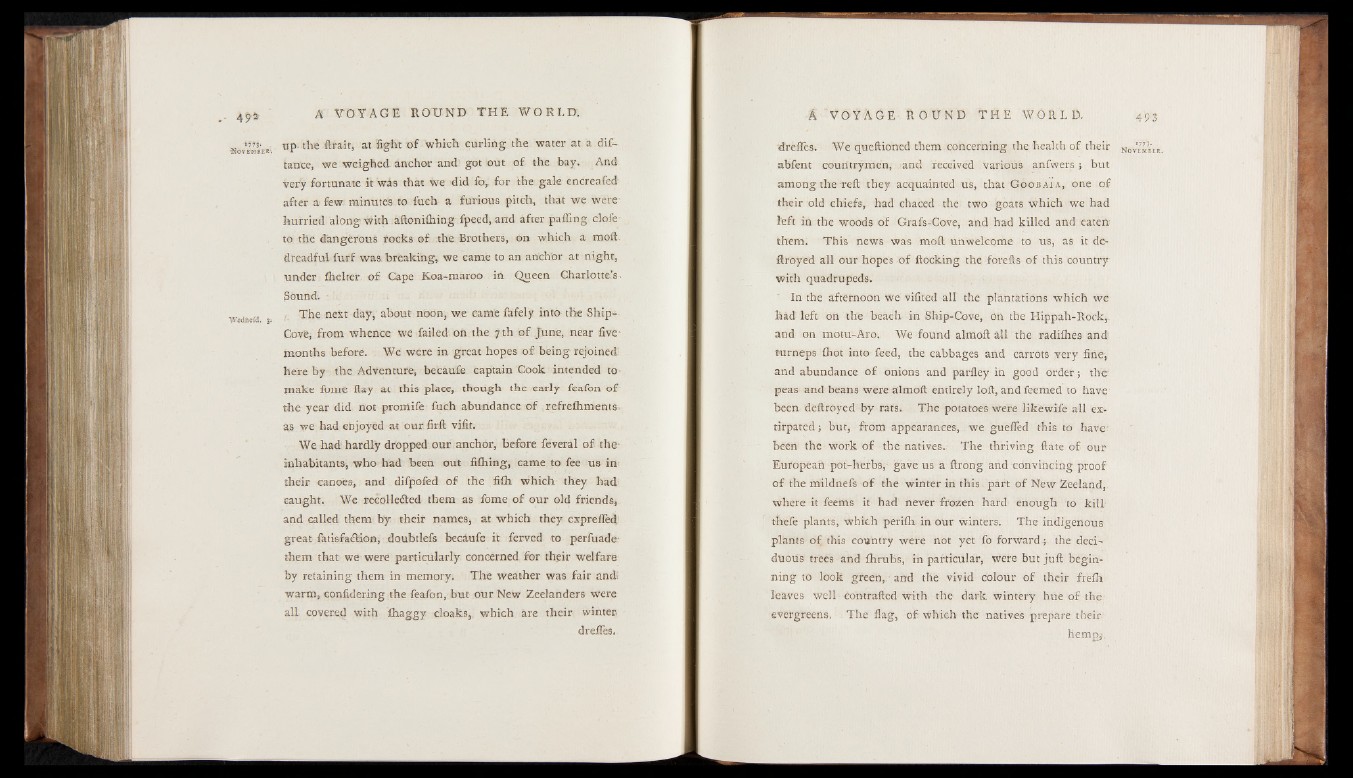
„.. >?»f Hp. the ftrait, at fight of which earling the water at a dif-
tance, we weighed anchor and got out of the bay. And
very fortunate it wis that we did fo, for the gale encreafed
after a few minutes to fueh a furious pitch, that we were
hurried along with aftonifhing fpeed, and after paffing clofe
to the dangerous rocks ©f the Brothers, on which a moft
dreadful furf was, breaking, we came to an anchor at night,
under fhelter of Cape Koa-maroo in Queen Charlotte’s.
Sound.
wtdnefl 3 The nest day, about noon, we came Rifely into the Ship-
Cove, from whence we failed on the 7 th of June, near five-
months before. We were in great hopes of being rejoined
here by the Adventure, beCaufe captain Cook intended to
make fome flay at this place, though the early feafon of
the year did not promife fuch abundance of refrefhments.
as we had enjoyed at our firft vifit.
We had hardly dropped our anchor, before feveral of the*
inhabitants, who had been out filhing, came to fee us in
their canoes, and difpofed of the fiih which they had:
caught. We recolledted them as fome of our old friends,
and called them by their names, at which they exprefled
great fatisfadtion, doubtlefs becaufe it ferved to perfuade-
them that we were particularly concerned for their welfare
by retaining them in memory. The weather was fair and.
warm, confidering the feafon, but our New Zeelanders were
all covered with fliaggy cloaks,, which are their winter
drefles.
drefles. We queftioned them concerning the health of their
abfent countrymen, and received various anfwers ; but
among the reft they acquainted us, that G oob a ia , one of
their old chiefs, had chaced the two goats which we had
left in the woods of Grafs-Cove, and had killed and eaten
them. This news was moft unwelcome to us, as it de-
ftrOyed all our hopes of flocking the forefts of this country
with quadrupeds.
In the afternoon we vifited all the plantations which we
had left on the beach in Ship-Cove, on the Hippah-Rock,.
and on motu-Aro. We found almoft all the radifhes and
turneps Ihot into feed, the cabbages and carrots very fine,
and abundance of onions and parfley in good order; the
peas and beans were almoft entirely loft, and feemed to have
been deftroyed by rats. The potatoes were likewife all extirpated
; but, from appearances, we guefled this to have:
been the work of the natives. The thriving ftate of our
European pot-herbs, gave us a ftrong and convincing proof
of the mildnefs of the winter in this part of New Zeeland,
where it feems it had never frozen hard enough to kill
thefe plants, which perifh in our winters. The indigenous
plants of, this country were not yet fo forward; the deciduous
trees and fhrubs, in particular, were but juft beginning
to look green, and the vivid colour of their frefh
leaves well eontrafted with the dark wintery hue of the
evergreens. The flag, of which the natives prepare their
hemgj.
November.